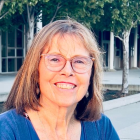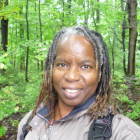Support strong Canadian climate journalism for 2025
These in-their-own-words pieces are told to Patricia Lane and co-edited with input from the interviewee for the purpose of brevity. In honour of Black History Month, today we highlight the climate justice work of Jacqueline L. Scott.
Jacqueline L. Scott is bringing the great Canadian outdoors to Black people.
Her University of Toronto PhD thesis explores barriers Blacks experience to being in nature and her public work focuses on removing them.

Tell us about your projects.
I advise outdoor educators, host “Race and Space” nature walks and write for media like the CBC, The Conversation, Canada’s National Observer, and the Greenbelt Foundation. I host a blog called Black Outdoors, tend a garden and am a leader in hiking and cycling clubs. My academic work contributes to scholarly inquiry about how race shapes who gets to enjoy our Canadian outdoors.
What are some of the ideas you convey?
On a “Race and Space” walk through a Toronto ravine, you would be asked to notice that the group is mostly white. White is a skin colour, but white people see it as neutral. Why is the rich multi-racial diversity of Toronto not reflected in the people who enjoy its marvellous ravines?
Neighbourhoods surrounding the ravines are higher income and these natural spaces are not visible from the street, mapped or easily accessible by transit.
You might count five or 10 bird species and compare that to racialized neighbourhoods where only pigeons are common. We would discuss the differences in smell and appearance of the river water and sewer outlets in the two environments and compare tree coverage.
When we do go into natural spaces, we stand out. Whites who feel threatened by behaviour they experience as strange, such as a Black person birdwatching, often feel fine about calling the police “just to be safe.” Police much too often react by carding us.
For too many Black people, “the outdoors” is not experienced as the welcoming, soothing, stress-reducing invitation it is for whites.

How are you working for change?
The first step is becoming aware of the need. People who walk with me see their landscape differently. Outdoor educators begin to understand how their current practices discourage participation. Where will a child living in a social housing highrise find the five different leaves for a school project? Where will a family without a backyard get the soil for the assigned school project to plant seeds at home?
It is also important they know their efforts to provide schoolchildren with time in wilder landscapes really matter. Many people tell me their one school field trip 40 years ago made all the difference in giving them a lifelong positive relationship with nature.

How did you get into this work?
I was raised in villages in England. When I came here, we lived in a 15-storey highrise. I loathed the distance to the earth. I saw a poster advertising an all-inclusive camping trip to a provincial park. Everything was supplied, so I went and was mesmerized by the wildness, the biodiversity, the rivers, forests, skies and the delight of being in nature.
After that, I made a point of doing outdoor activities but was almost always the only one of my Black friends who was interested and the only Black or person of colour in the group. My friends said I was just someone who walked to the beat of my own drum. But eventually, I began to ask what else might be going on. It was so wonderful for me to be outside — why were so few people who looked like me benefiting from this experience? This led me to study Black history in Canada and my PhD studies.
What makes your work hard?
There has been very little research on this in Canada, but there is a lot in the U.S. Since both countries had slavery as a foundational economic policy, there are more similarities in our respective imaginations about who belongs outdoors than many white Canadians would like to believe.
As long as the dominant Canadian narrative is that race is not a problem, we will have environmental conferences without Black voices and Parks Canada will publish literature without photos of Black people enjoying a park. I have yet to meet a Black Parks Canada warden. I am more likely to imagine being able to get help if I need it from someone who looks like me. If I am unable to imagine asking for help, I am much less likely to step outside my comfort zone.

What gives you hope?
The next generation is not waiting to feel safe in spaces created by the dominant culture. They are making their own. Groups with hashtags like #BlackGirlsHike, #FlockTogether, #BlackEcology and many others are well-populated and their members are getting outside.
What do you see if we get this right?
We will all be able to breathe.
What would you like to say to young people?
Keep doing what you are doing and don’t give up.
What about older readers?
The kids are actually not all right.
The dinosaurs had no choice about their future, but we do. Black, Indigenous and people of colour have done the least to create the climate crisis and they are paying the highest price.
Support the young people around you. They deserve better.







Comments